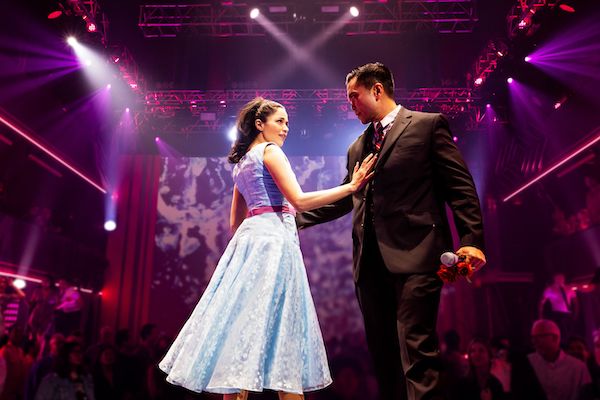Theater Review – “Here Lies Love” Lies Flat on Broadway
By Christopher Caggiano
The David Byrne-Fatboy Slim musical makes its long-awaited Broadway bow. (Well, long-awaited by some…)

Arielle Jacobs and Jose Llana in Here Lies Love. Photo: Billy Bustamente, Mathew Murphy, and Evan Zimmerman
It started at MASS MoCA in 2012. There were rumors of a workshop up in North Adams, Massachusetts, of a new immersive musical by David Byrne, formerly of the Talking Heads, and Fatboy Slim, a British music producer and DJ.
Also intriguing, the musical was apparently about Imelda Marcos, former first lady of the Philippines, and — get this — didn’t mention her 3,000 pairs of shoes at all. Like, at all. The workshop run was completely sold out, but word of mouth was rapturous and there was every indication that this show would eventually transfer to New York City.
When the musical, entitled Here Lies Love, premiered at the Public Theater in 2013, critics wrote love letters, praising its lively score and immersive staging. Word quickly spread and the show became a sell-out hit, so much so that it returned to the Public in 2014 for an encore run, which was similarly well received.
I saw the show in 2013. I saw it again in 2014. And last week I saw its premier on Broadway. And I just don’t get it.
My reaction to the show was so out of sync with the critical consensus that I figured I must have missed something the first time. In 2013, I was seated above the action. The show famously features audience members standing and moving about on a dance floor. But there are also actual seats surrounding the dance floor and — now that the show has moved to the Broadway Theater — the theater’s balcony overlooks a completely transformed orchestra section specially designed for this production. I thought that maybe the experience was different for people who were actually participating in the proceedings. So I went back in 2014 and stood among the masses. Same reaction.
I really should have known better. As both a critic and a teacher, I’ve often said that the key to whether a musical truly works is in the text: the words and the music. Production elements can enhance the quality of the show, but the essential quality needs to be there in the first place. A truly great show will work in a church basement with the cast performing at music stands.
But people whose opinions I genuinely respect have raved about Here Lies Love, insisting that the songs are richly realized and admiring the show’s supposedly complex portrait of Philippine’s First Lady, Imelda Marcos. So I’m left to wonder: Are we seeing the same show? I find it gimmicky, shallow, and uninvolving. And loud. Very, very loud. What’s more, the whole “local girl makes good, weds famous man” thing has been done before and better. Here Lies Love is basically Evita Lite.

Conrad Ricamora and Arielle Jacobs in Here Lies Love. Photo: Billy Bustamente, Mathew Murphy, and Evan Zimmerman
In truth, I’m not the only person critical of the show, but I’m not exactly on board with these other critics either. Some have raised concerns about the show’s supposed tendency to glorify or at least sympathize with Imelda Marcos. But no one who’s actually seen the show could credibly claim this.
At the start of the musical we are given a sympathetic Imelda, a poor young girl who later rises to fame and power, but Here Lies Love very clearly, almost ham-handedly, points out Imelda’s excesses and cruelty once she climbs to the top and, while her husband is sick, serves as acting president. The show also portrays the harmful effects of the Marcos regime and how bereft Imelda is when everything comes crashing down around her.
Still others have criticized the musical for not being historically accurate. Here’s something else I’ve said many times: Musicals are not documentaries. Creators have no obligation to stick to the facts. Their only obligation is to put together a meaningful and entertaining show.
And it’s here where I find fault with Here Lies Love. It is neither moving nor diverting. I don’t care about the characters, and I don’t really enjoy the journey, no matter how much director Alex Timbers pumps up the proceedings with light shows and disco balls.
Again, it’s all about the text. While the songs do relate the story, they don’t go very deep into the characters. They are mostly flat and expository, albeit with pleasant melodies and a driving disco/techno beat. I’ve long been a fan of David Byrne and applaud his ambitions to expand into musical theater. But overall his lyrics are too indirect and fragmented to be truly effective in a musical. They’re either painfully obvious or maddeningly oblique.
In terms of the obvious, when the Marcos regime implodes, Imelda sings “Why don’t you love me?”, seemingly ad nauseam. As for oblique, at Ninoy Aquino’s funeral, his mother sings a lament and asks mourners why they’ve come. “Just ask the flowers,” they reply. Um…what?
The problem isn’t that the show glorifies the Marcos characters. The problem is those characters are thin to the point of being diaphanous. The only figure with any real heft to him is Ninoy Aquino, but even his songs are detrimentally expository.
The plot leaves too many questions unanswered, particularly with respect to character motivations. How did Ferdinand Marcos and Imelda meet? Why did he marry Imelda? Why does he do a 180 immediately after they marry? Why does he suddenly turn into a cold brute, dictating what she wears and forcing her to take drugs — uppers, downers, weight loss pills, calcium supplements? The same vial of drugs seems to accomplish different things in different scenes, so it’s hard to tell.

Arielle Jacobs in Here Lies Love. Photo: Billy Bustamente, Mathew Murphy, and Evan Zimmerman
What’s more, Timbers relies too much on projections of pictures and text to relate the plot and establish time and place. At one point, we see footage of the real Imelda partying down with celebrities and international leaders. At another point, the projections show the hardships that the Philippine people endured under the Marcos rule. This overreliance on projections to tell the story is tantamount to admitting that the show’s content isn’t fully doing its job.
Also, as for all that supposedly innovative staging, the decision to set the entire show in a dance club, while certainly reflective of Imelda’s party hearty lifestyle, doesn’t quite work when the story moves onto dramatizing the dour aspects of her life and the reign of the Marcos regime.
Admittedly, I’ve never been much of a fan of immersive theater. I remember climbing up and down six flights of stairs at Sleep No More and thinking, “You know, I prefer to have my theater come to me.” Thankfully at Here Lies Love there’s the option of being seated, but even then, the DJ (because of course there’s a DJ) hectors the audience into standing up and dancing. No, thanks.
Thankfully, the cast of Here Lies Love is full of first-rate talent, particularly Conrad Ricamora as Ninoy Aquino and Jose Llana as Ferdinand Marcos. As for Arielle Jacobs, she’s in fine voice but I felt a bit more for Imelda when Ruthie Ann Miles played her at the Public.
There’s been a good deal of talk about how this is the first Broadway musical with an all-Filipino cast. I certainly applaud representation and diversity. But as we saw with KPOP last season, and now Here Lies Love this season, authentic casting may be admirable, but it’s no guarantee that the show itself is any good.
Christopher Caggiano is a freelance writer and editor living in Boston. He has written about theater for a variety of outlets, including TheaterMania.com, American Theatre, and Dramatics magazine. He also taught musical-theater history for 16 years and is working on numerous book projects based on his research.
Tagged: Alex Timbers, Arielle Jacobs, Conrad Ricamora, David Byrne, Fatboy Slim, Here Lies Love, Imelda Marcos


Totally agree!
I am Filipino and I grew up in the Philippines during the 70’s and 80’s with the elder Marcos in power. I know the story well including Ninoy Aquino’s attempt to return to the Philippines only to be shot as he descended the steps off the plane thus triggering public protests and ultimately a peaceful revolution that ousted the Marcos family.
To me, Imelda and Ferdinand are not really that complex of characters. They are simply greedy, corrupt, and heartless to the core. Despite, Imelda’s “humble” beginnings, she was always somewhat of an out of touch narcissist whose ideas about governing seem socially sound on the surface but always with flawed execution. She valued friendships and kept a circle of friends and treated them lavishly because they fed on her sense of importance. This is why I’m not surprised with the way this musical presented her as superficial and one dimensional which I think that’s how she really is in life. Ninoy, on the other hand, was quite a promising figure at the time and was a hopeful figure for change which is why his assassination left an impact.
As far as Here Lies Love, I’ve heard of this show for a while and was excited to see it finally on Broadway since I never saw any of its previous versions. Overall, I thought it was an enjoyable experience but certainly not perfect. I do agree that the choice to portray Ninoy’s mother singing “just as ask the flowers” wasn’t well thought of. The visuals on the stage made more impact than the song itself which doesn’t make a lot of sense. Lea Salonga’s singing saved the song basically. Also surprised that Cory, Ninoy’s widow, who became president after the Marcoses left did not have a more significant role.
Thanks so much for your perspective, Jim. It’s particularly illuminating to hear from someone who was there.
I also saw HLL at the Public a decade ago, and recently saw it on Broadway. I have a different take on the show. While I agree that with most traditional shows, the “text” is key to the quality of the show, HLL is anything but a traditional musical. I think David Byrne, in his artistic genius, did not seek to simply tell the story of the Marcos era in a compelling way. Instead, he wanted to explore the question of how these greedy, narcissistic monsters could become so popular and powerful, as they flaunted their excessive wealth in front of a struggling nation. It think Byrne concluded that the only explanation is that the Filipino people got caught up in a cult of personality, and got swept up in the extravagance and glamor of these scam artists, until the spell finally wore off.
Byrne may have decided that it would be impossible for a western audience to truly understand what happened — and to understand how they, too, could get swept up in a cult of personality — by watching a traditional show that simply tells the story. Instead, HLL helps the audience to understand this story in a more visceral, emotional way, rather than a rational, cerebral one.
By being in the nightclub disco setting, the audience is immersed in the action, surrounded by music, dancing, projected images, and larger-than-life figures on stage above them. Before they know it, the audience gets swept up in the spectacle, and halfway through the show, find themselves cheering for Ferdinand Marcos as he gives a speech. At that point, the audience comes to understand the story of the Marcos reign in a way that traditional storytelling could never convey. They understand it because they, too, got caught up in the spectacle. They too felt the excitement, and maybe relegated their rational mind to the background briefly. Our rational mind often puts up obstacles and arguments that keep us from truly opening our minds to a new understanding. The disco nightclub setting is key to this transformative experience; it’s hard to imagine experiencing the same effect while sitting in a traditional theater. In my view, this is the brilliance and the beauty of HLL. Like all great art, it helps us to see something in a way we couldn’t have seen it otherwise, and opens our eyes to new understandings.
Ah yeah you make a good point here.
Tony, that’s a very interesting and, I think, valid perspective. Perhaps I’m mired in expectations borne of a dedication to traditional musical theater. I can only work with what I have. Still, I can’t say I want to see the show again or listen to the cast recording.
Saw this show last week with my daughter (we bought tickets before show had opened at her suggestion). I am just young enough that I knew who Imelda was, but really didn’t know the history. My daughter of course knew nothing about it, although we both read a bit prior to seeing it. We both found this production to be innovative and thought provoking. I agree with you — music is one of the weaker links of this show. However, I felt it was more than made up for when considering the total impact of the production. And, it can’t be bad art if it makes a 21 year old excited about theater and discussing history!
I think reading up on the story in advance does help. The plot covers a long period of history and many events were not given enough attention perhaps due to the 90-minute run. I also think that it’s not just a Philippines story…the musical did a good job connecting US foreign policy to the events and how the two countries are intertwined.
Hey, anything that gets young folk into the theater, that’s what I say.
I love David Byrne and the quirkiness that he brought to his own show. Here Lies Loves was the worst show that I ever saw on Broadway. The songs lyrics were not catchy and the actually singing was marginal.The stage looked so interesting and dynamic before the production began. During the production it was hard to follow where the actors were and the sound shifted and was not consistent. The seat was horribly uncomfortable. I have been to over 50 Broadway shows and the was in the top 3 worst one.
Thank you for your honest review. Me and my friend watched it and felt the same way. I am no musical expert but the story can be told in a more “traditional” Broadway, elevated standard. We still enjoyed our time talking about the musical from all angles. Importantly, I am glad that the story of Ferdinand and Imelda Marcos is being shared in another mainstream fashion. The makers of Here Lies Love mean well and I admire their dedication to the cause and their craft. Lastly, I would enjoin all to watch the documentary film The Kingmaker to gain additional perspective about those years.
You are a brave and hard-working journalist to see a play you disliked from the start several times over! You pose some fine issues, even for a reader like myself with no intention to see Here Lies Love. Your well-crafted analysis kept my interest throughout. I do think rock/pop legends live in a highly protected world, where fans aren’t just audience members but the adoring masses. (I just happened to catch Elvis Presley’s 1950s film Jailhouse Rock, often called one of Elvis’ few half-way decent flicks. It was as dreadful as his bottom-of-the barrel stinkers. Forget acting. He didn’t know how to even lip-cinque. On the avant-garde side of town, Byrne can do no wrong. Only the rare and courageous critic will tell it like it is.
Thank you. Really appreciate this review. You’ve articulately captured what I had felt after seeing this musical. Now with its recently announced early end,just such a disappointment.But guessing you were not surprised?
I’m a Filipino American who loves musical theatre and had been rooting for this production to succeed. In the Filipino community, this show is incredibly polarizing (for multiple reasons), so its very early end was no surprise to us. From the jump, it was making so many eye-raising choices — the whole no live musicians/no orchestra issue (that they weakly tried to defend for so long and only fixed last minute due to an impending Broadway boycott), not paying fully or fairly for its use of past recorded tracks, its lack of Filipino consultants (and not just Fil-Ams) behind the scenes (excluding, of course, the mega-talented Clint Ramos whose impeccable and iconic style couldn’t even save this show), its predominantly white/non-Filipino team driving key story/production decisions, including perhaps its most detrimental, the poor marketing of this show.
When I saw Here Lies Love opening week, I fully appreciated it as a Filipino. I even cried during the closing number and Lea’s performance — truly, the best parts were Lea Salonga (her albeit too brief guest role) and Conrad Ricamora (like Ninoy, he’s the best thing about this whole story.) But Filipino Americans, for all their talent, sadly lack in true representation in Hollywood and on Broadway. Even as a thriving community, we have so little to support, that we just really needed this to win. But sadly, with all its missteps, Here Lies Love just couldn’t cross the finish line.
Miranda, I completely agree with you about Filipino representation. I genuinely celebrate the fact that HLL was the first all-Filipino cast on Broadway, and I agree that all entertainment media have a long way to go toward full representation.
I take no pleasure in the show’s short run. And I look forward to future efforts that do even greater justice to the culture and history of the Philippines.